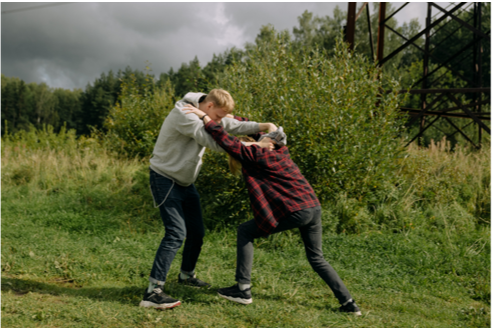By Chaplain (Col) Stephen W. Leonard, USA, Ret.
It’s every parent’s nightmare. A teen son spiraling into crisis and heading for serious trouble with the law, an interruption from education and a complete lack of respect for authority. Whether it stems from violent behavior or depression, it’s obvious when a real problem is present. You can see the life-altering effects it will have. Before it gets to the point that a place like Paul Anderson Youth Home is the next step — before the damage is done — there are ways to help guide teen boys back to the straight-and-narrow.
Confronting violent behavior and finding common ground
Confronting violent behavior in your teenager is a challenging and complex process. It is important to approach the situation calmly and without judgement, while also taking immediate action to ensure the safety of everyone involved. If tensions in a situation have decreased enough to allow for it, encourage open and honest communication. If this is an ongoing challenge, seek professional help if necessary. It’s crucial to set clear and consistent boundaries and consequences for violent behavior, while also providing positive reinforcement for nonviolent behavior. Remember to lead by example and model appropriate behavior yourself. Your child is watching you even when you think they are not. Ultimately, addressing violent behavior in your teen boy requires a combination of patience, understanding and firmness to create a safe and healthy environment for everyone.
One way to get violent outbursts under control is finding common ground with a troubled teen. It isn’t an easy process, but it is essential for building a healthy relationship free of physical altercation. Start by listening actively to their concerns and validating their feelings, even if you don’t agree with them. Prioritize spending quality time with your teen by taking the time for shared interests and hobbies that you can engage in together. It’s also important to avoid resorting to ultimatums or power struggles. By focusing on problem-solving together, it shows respect for their autonomy and involves them in decision-making. These simple gestures show how much easier life can be when you aren’t always fighting, whether actually or metaphorically. However, if violent behavior persists, professional help is needed. It will take a great deal of patience and support to help your teenager resist violent urges, but a strong and positive relationship takes time and effort. It is undoubtedly worth it in the end.
Spot the signs of depression

Out-of-control behavior in a teen boy may have more serious root causes that result in problematic violent outbursts. No one expects an untrained eye to be able to diagnose mental or emotional issues, but recognizing signs of depression in your teenager is critical for early intervention and effective treatment. Look for changes in behavior such as sudden withdrawal from friends and family, loss of interest in activities once enjoyed, changes in appetite or sleep patterns, persistent feeling of sadness or hopelessness and irritability or anger that often leads to violence. Physical symptoms such as headaches or stomachaches can also indicate depression. Knowing what social media your teen is consuming is also important. Keeping open lines of communication will help you spot other signs of negativity or self-harm. It’s essential to create a safe and open environment for your teenager to discuss their feelings and seek professional help if needed. Don’t hesitate to reach out to clergy or a mental health professional for support and guidance. Remember, depression is treatable, and early intervention can make a significant difference.
Listening to your teen without judgment is an essential part of building a healthy and positive relationship with them. This environment makes your teen feel more comfortable sharing what’s on their mind. Give your full attention when they speak, and avoid interrupting or dismissing their concerns. Unless they are strongly opposed to the values you want your teenager to live by, be sure to validate their feelings, even if you don’t fully agree with them. Empathy and understanding are key, but responsibility and guidance are needed. Remember, active listening is about understanding, not solving their problems. Encourage open and honest communication, and let them know you are there to support them.
Self-care goes a long way
Since teenagers are on the cusp of adulthood, even with behavioral problems, self-care can help the transition. Good habits ensure holistic well-being of oneself, and an out-of-control teen can greatly benefit from this practice. Encourage your teen to engage in activities that promote physical, spiritual, mental, and emotional well-being, like exercise, prayer, meditation, and creative pursuits. Help them establish a routine that includes regular sleep, healthy meals and time for relaxation. Allow them to express their feelings and emotions through journaling or talking to a trusted adult, mentor or therapist. Teach them coping skills to manage stress and anxiety, which will lead to better decisions in difficult moments. Don’t forget to provide positive reinforcement and praise their efforts, even for small accomplishments. Help them set realistic goals and celebrate their successes. Self-care is a lifelong practice, and it’s best to start early.
At Paul Anderson Youth Home, we know how behavioral problems left unchecked can turn into legal issues and potential incarceration. This can have devastating effects in the short-and long-term. Knowing how to recognize and mitigate an out-of-control teenager is the first step. How you proceed from there can make the difference between your teen in a rebellious phase and your teen facing serious trouble with the law that will limit the success of their future years.
Stay Updated
Sign up for our monthly newsletter and weekly devotional











